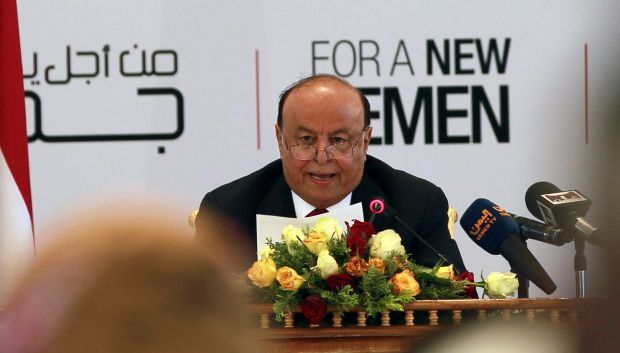
Yemen’s President Abd-Rabbu Mansour Hadi speaks during the closing ceremony of a national dialogue conference aimed at drafting a new constitution and establishing a federal state on January 25, 2014 in Sana’a. (AFP PHOTO/ MOHAMMED HUWAIS)
In comments to Asharq Al-Awsat, national dialogue Deputy Secretary-General Yasser Al-Raini said: “An agreement has been reached to expand the commission so that all components [of Yemen] are represented. The South will have 50 percent of representation at the committee, with 20 percent for the youth and 30 percent for women.”
The committee is tasked with implementing the agreements made at the national dialogue, including the drafting of a new constitution.
As for whether the deteriorating security situation in the country poses a threat to implementing the national dialogue agreements, Raini stressed that the Yemeni authorities should do everything in their power to ensure national security and stability.
“It is the responsibility of Yemen’s executive, security and military forces to perform their duty in arresting saboteurs,” he said.
Commenting on the possibility of future governments being formed according to a quota system, Raini said: “Appointments in executive bodies should take place according to certain criteria, such as qualification, experience and good governance.”
Raini hailed the results of the national dialogue, and added that the general public were satisfied with the achievements made during the talks. He said: “This was the first conference in Yemen’s history to be attended by forces from across the political and social spectrum.”
“The results of the Yemeni National Dialogue are at the core of the aspirations of the Yemeni people,” he told Asharq Al-Awsat, adding that these agreements would serve as the basis for a constitution that would later be put to public referendum.
However, Raini also acknowledged “the difficulty of turning all [national dialogue] decisions into constitutional formulas,” given that the results of the national dialogue included “constitutional, legal, and administrative decisions, recommendations and observations.”
He told Asharq Al-Awsat that the key challenge faced by the national dialogue had been to bring “all sides to one table,” and added that this would have been impossible without all political players agreeing to abandon the “language of bullets.”
